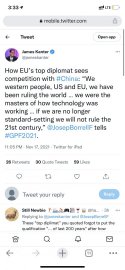I will follow both WTO cases in coming weeks and months. In that way you learn how the shit functions. The EU is coordinating with the US and Japan.Can EU even do local infrastructure properly in their own countries? Is that German airport in operation yet after all this time? Also, the WTO that can't handle cases because the US blocked appointment of new judges? They'll be waiting a long time for a decision when they in pretty bad shape right now.
You are using an out of date browser. It may not display this or other websites correctly.
You should upgrade or use an alternative browser.
You should upgrade or use an alternative browser.
Miscellaneous News
- Thread starter bd popeye
- Start date
Indeed, EU is an enemy. Proof:Good attempt from Beijing in trying to tackle the long arms jurisdiction of the West. They make all sort of trade rules among themselves + Japan (through the EU+ US Trade and technology council and trilateral US+EU+Japan) about intellectual property, setting tech standards, export controls and subsidies and then their own companies try to shove the IP rules through our throats using their own courts. There is no 'fair' trade (euphemism for neoliberalism). Only might makes right. The rest is sweet words for ignorant children. We should fight tooth and nail for our future including the menace that are US, EU and Japan.

I am one of few domain experts on this planet that know this crap inside out. It is WST and politics that destroyed the US telecom engineering. Once you fall behind state-of-the-art telecom R&D, it is extremely hard to catch up, US included. Throwing money at it may help but certainly not the only factor. As many talented engineers and technicians washed out of that industry, it is not statistically impossible but definitely a tall order to get it all back.China’s 5G Soars Over America’s
In some U.S. cities, it’s slower than the old 4G system. Washington should make it a priority.
By Graham Allison and Eric Schmidt
Feb. 16, 2022 6:27 pm ET
At this point, football fans have seen so many ads from AT&T and Verizon claiming to have the fastest and most reliable 5G service on the planet that those without a 5G smartphone might think they are really missing something. Don’t be misled. Unless you are traveling internationally, you won’t enjoy faster speeds with a new 5G-enabled smartphone than you’d get on a 4G phone streaming games from New York, Los Angeles or many other U.S. cities. AT&T’s and Verizon’s new 5G networks are often significantly slower than the 4G networks they replace. America is far behind in almost every dimension of 5G while other nations—including China—race ahead.
America’s average 5G mobile internet speed is roughly 75 megabits per second, which is abysmal. In China’s urban centers 5G phones get average speeds of 300 megabits per second. Though that’s not quite the fastest 5G in the world -- South Korea claims that title at over 400 Mbps -- it’s still fast enough to download a high-definition movie in two minutes. Mobile internet speed is a central advancement of 5G, which enables a new domain of breakthrough applications with potent economic and national-security implications. American 5G upload speeds are slower than those of many developed countries, including Israel, Singapore and Canada. In Boston, Chicago and New York City, AT&T’s 5G speeds are at least 10% slower than its 4G; in Washington, Los Angeles and Austin, Texas, Verizon’s 5G speeds are at least 20% slower than the company’s 4G.
The U.S. also trails China in the global market for 5G-related services. Although American sanctions have hurt Huawei, China’s national champion is still the global leader in supplying 5G infrastructure with 30% of the market, while no U.S. firms sell 5G infrastructure abroad. Strategically significant countries including Russia, Saudi Arabia, South Africa and Turkey have installed Huawei infrastructure and are already using it to deliver 5G services.
While Beijing has prioritized broadening its 5G network, Washington has a dysfunctional relationship with the U.S. mobile industry -- as typified by the Federal Aviation Administration’s hysterics over the proximity of American airports to 5G services, which operate near scores of airports around the world with no problem. For its part, China has been rapidly allocating the most efficient part of the wireless spectrum, called midband, to 5G service providers. China has deployed at least three times as much midband to 5G providers as the U.S. has. AT&T and Verizon are using the same spectrum bands for both their 4G and 5G networks. As a result, as one industry analyst aptly put it, their 5G networks are “just 4G with sprinkles on it.”
Washington’s dithering has left America well behind China in the race to build 5G infrastructure. Because 5G signals have short wavelengths, reliable service requires proximity to many wireless base stations. China has installed more than one million 5G base stations, while the U.S. has built only 100,000. The American fiber-optic network is also less dense than that of many developed countries like Japan, making it more difficult for mobile operators to deploy these small cell sites.
China’s investment in 5G also dwarfs America’s. The Innovation and Competition Act, which Senate Majority Leader Chuck Schumer hailed as “the key to preserving America’s position on the world stage as a current and future technological leader in the 21st century,” would authorize $1.5 billion in spending on 5G mobile networks through 2026. China has already spent $50 billion to build out its 5G network and is on track to spend an additional $100 billion on 5G over the next five years.
The pathetic U.S. performance in the 5G race is a sign of America’s larger failure to keep up with China on strategically important technologies. China is also ahead of America in high-tech manufacturing, green energy and many applications of artificial intelligence. On current trajectories, by 2030 it will likely lead the U.S. in the number of semiconductor chips it produces and in applications of biotechnology to defeat diseases like cancer.
In 2019 the Pentagon’s Defense Innovation Board tried to sound the alarm, stating bluntly: “China is on a track to repeat in 5G what happened with the U.S. in 4G.” The transition from 3G to 4G made possible a previously unimaginable world of mobile computing, smartphones and applications from Google Maps and Uber to Facebook and Instagram. The step up to real 5G speeds will lead to analogous breakthroughs in autonomous vehicles, virtual-reality applications like the metaverse, and other areas that have yet to be invented. Applications abound that could advantage a country’s intelligence agencies and enhance its military capabilities.
It will take far more than an additional $1.5 billion investment from Congress to change this. The Biden administration should make 5G a national priority and take the lead in building digital highways across the country as the government did in creating our national highway system. Otherwise, China will own the 5G future.
Mr. Allison, a professor of government at Harvard, is author of “Destined for War: Can America and China Escape Thucydides’s Trap?” Mr. Schmidt was CEO of Google, 2001-11 and executive chairman of Google and its successor, Alphabet Inc., 2011-17 and is a co-author of “The Age of AI: And Our Human Future.”
I am one of few domain experts on this planet that know this crap inside out. It is WST and politics that destroyed the US telecom engineering. Once you fall behind state-of-the-art telecom R&D, it is extremely hard to catch up, US included. Throwing money at it may help but certainly not the only factor. As many talented engineers and technicians washed out of that industry, it is not statistically impossible but definitely a tall order to get it all back.
What's your assessment of the chance of US getting back to the game, 6G and StarLink and such?
We stand for the people of Ottawa as they battle the tinpot dictator Trudeau
6G is basically a fight for standards. Telecom standards literally started with Belcore/Telcodia of AT&T heritage. When GSM got popular, that was when non-US countries started chipping away the standards power. When 3GPP took over the mobile standards, US lost control of telecom standards monopoly.What's your assessment of the chance of US getting back to the game, 6G and StarLink and such?
5G with universal 1Gbps up/down throughput and advertised latency will meet >99% of modern apps for decades to come. US probably only has a chance of taking back via standards fight instead of a raw technology fight. So 6G is going to be largely a political fight.
I still have some memory of Iridium. I don't now when RF/Microwave technologies can reach to a point where satellite coverage can be as good as cell towers today. Eventually, we may get there via satellites plus near space UAVs. But for the rest of my life, satellites are not going to totally replace cell towers. Possibly a hybrid access model.
5G is revolutionary, not exactly like what Eric Schmidt or Graham Allison described. The defining characteristic of a telecom network is of deterministic, in comparison to an IT network (random, bursty, unreliable). When, in years or decades, 5G networks can have deterministic 1Gbps and millisecond-latency, even telemedicine would become what social media is on a smart phone today. Robots can be everywhere doing almost anything. Life would be very different from what I am used to now.


